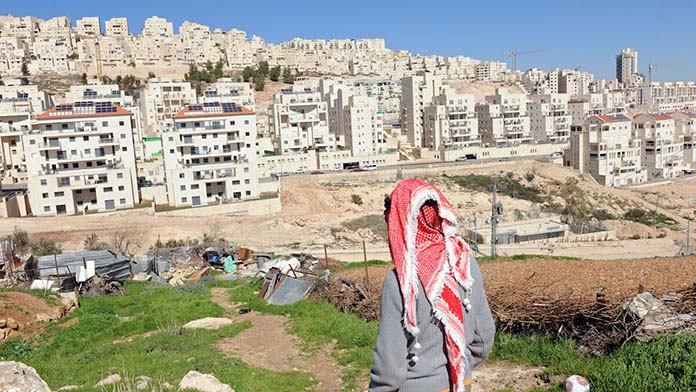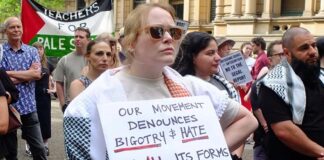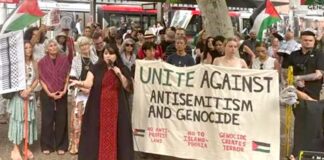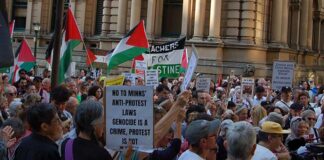Israel was founded 75 years ago through the massacre and expulsion of Palestinians, argues Raul Haagensen, and the brutality and dispossession continues today
This year on 15 May marks 75 years since the founding of the state of Israel in 1948.
In Israel this was celebrated as the beginning of a great and prosperous country, the year Zionists succeeded in settling an empty land and making the desert bloom.
For Palestinians, however, it is the anniversary of the Nakba—Arabic for “catastrophe”. The Israeli state’s real origins are in the brutal expulsion and ethnic cleansing of Palestinians from their native land.
This was marked at the UN for the first time this year—although countries including Australia, the US and Europe boycotted the commemoration.
From December 1947, Zionist forces set out to massacre and expel the Palestinian inhabitants. They razed villages and whole neighbourhoods to the ground.
In the end, thousands of Palestinians were killed, more than 750,000 were expelled, and 531 villages and 11 urban neighbourhoods were destroyed.
The Zionists’ success in creating a Jewish state in Palestine was only possible due to the backing of major imperialist powers.
Zionism first emerged in Europe in the late 1880s in response to increasing antisemitism and repression. The idea was to establish an exclusively Jewish state as a safe-haven from the persecutions and the pogroms in Europe. But it was a highly pessimistic and reactionary response that meant settling and colonising another country.
By the beginning of the 20th century most Zionist leaders were focused on colonising Palestine, a land, in their eyes, occupied by “strangers” and in need of repossessing. But to be successful they recognised that they would need the support of a major European power and to prove themselves as supporters of imperialism.
Their first big step forward came when the Zionists managed to secure the support of the British Empire in the Balfour Declaration of 1917.
Britain wanted to occupy Palestine after the First World War to increase its control of the Middle East. The Zionists offered to help police the Palestinian population in return for a commitment from Britain to support the creation of a “national home” there for the Jewish people.
The agreement resulted in a sharp increase in the number of Zionist settlers allowed into Palestine after the war.
Partition plan
By the end of the Second World War, with the British Empire beginning to crumble, Britain transferred the issue of Palestine’s sovereignty over the United Nations (UN) General Assembly.
Despite Palestinian hopes for independence, they soon found that they would have to negotiate for their land with the Zionists.
In protest, the Palestinians boycotted the UN processes.
The US, then at the height of its international influence, saw a Jewish state that would be reliant on imperialist support as potentially useful in its plans to dominate the Middle East. Unsurprisingly, the resulting UN plan overwhelmingly favoured the Zionists.
Despite the fact that Jewish settlers made up only a third of the population and most of them had arrived only a few years earlier, the map that was finally drawn up gave the Jewish state 56 per cent of Palestine while Palestinians received only 42 per cent, with the final 2 per cent made up of a small enclave around Jerusalem that was supposed to be internationally governed.
The plan was a complete disaster. In the first instance, it trampled on the rights of the Palestinians who were two-thirds of the population. Even more disastrous was the fact it gave the Zionists control over territory housing over 400,000 Palestinians—to a movement that had openly declared in the 1930s that it wanted to de-Arabise Palestine completely. The plan was nothing short of handing a loaded gun to the Zionists.
Yet it was supported by 33 countries, the US, the USSR, and Australia among them.
The Nakba
In public, the Zionists accepted the terms of the partition plan. In private, they had no intention of ever following it and were preparing to seize even more land.
David Ben-Gurion, the mastermind behind the ethnic cleansing and the future prime minister of Israel, set out to secure 80 to 90 per cent of the territory of Palestine and to ensure an overwhelming Jewish ethnic predominance. The Zionists were keenly aware they were a minority in the country and the difficulty this would pose in maintaining a Jewish state in Palestine.
Their solution was mass ethnic cleansing: “I am for compulsory transfer,” Ben-Gurion said, “I do not see anything immoral in it.”
What they did take from the partition plan, however, was the blessing of the international community for a Jewish state in Palestine. Its borders and its population they would determine by force.
The partition plan was adopted on 29 November 1947, and the ethnic cleansing of Palestine began shortly after, starting with a series of attacks on Palestinian villages and neighbourhoods that spread sufficient terror to cause an exodus of almost 75,000 people.
When Jewish troops attacked the village of Khisas, they started blowing up houses at random, killing 15 villagers in the process, including five children.
On 31 December, Zionist forces decided to ransack the village of Balad al-Shaykh and massacre a large number of its inhabitants. The commander in charge was ordered to “encircle the village, kill the largest possible number of men, damage property, but refrain from attacking women and children.” It left over 60 Palestinians dead.
Over the next couple of months the Zionist leadership grew bolder. In February, Ben-Gurion said: “When I come now to Jerusalem I feel I am in a Jewish city. In many Arab neighbourhoods in the West you do not even see one Arab… And what happened in Jerusalem and Haifa can happen in large parts of the country.”
The UN had committed to be present on the ground to supervise the implementation of the plan, and to prevent fighting or confiscation of land. In reality, they took no action beyond watching and reporting the atrocities being committed.
The British also did nothing to stop the ethnic cleansing, despite the fact that their armed forces far outnumbered what the Zionists had at their command.
On 10 March 1948, Plan Dalet, a plan to seize control of the bulk of Palestine, was adopted. It signalled a shift from sporadic and retaliatory attacks towards a systematic operation of ethnic cleansing.
The plan included instructions that authorised actions in “destroying villages (by setting fire to them, by blowing them up, and by planting mines in their debris)” and recommended that “In case of resistance, the armed forces must be wiped out and the population expelled outside the borders of the state.”
Hundreds of villages were attacked and occupied, the people expelled, the buildings destroyed and the villages wiped from existence.
In some of them, the attacks were accompanied by massacres. The most notorious was that in Deir Yassin, carried out by two Zionist militias, the Irgun and the Stern gang.
As they entered the village, on 9 April 1948, they sprayed the houses with machine-gun fire, killing many of the inhabitants. They then went around throwing grenades in each and every house. Those who survived or were captured were then gathered up, abused and shot. Afterwards a group of 25 boys and men were put in a truck and paraded through Jerusalem, then taken to a quarry and shot. The number of people massacred was around 110.
When Mordecai Gichcon, an officer in the Zionist militia, later arrived at the scene, it reminded him of the antisemitic pogroms in Russia: “If you are coming into a civilian locale and dead people are scattered around in it—then it looks like a pogrom”, he reminisced years later.
Atrocities
Zionist leaders used the Holocaust to justify the atrocities. They warned of a second Holocaust perpetrated by Palestinians and invading Arab armies and invited Zionist soldiers to liken Palestinian villagers to Nazis.
According to Israeli-born historian and socialist Ilan Pappe’s The Ethnic Cleansing of Palestine this “was a deliberate public relations ploy to ensure that, three years after the Holocaust, Jewish soldiers would not lose heart when ordered to cleanse, kill and destroy other human beings”.
On 15 May, Ben-Gurion announced the founding of the Israeli state, as the British finally left the country.
The Arab League, representing five countries, declared war and sent troops against the new Zionist state. But it was a half-hearted effort. King Abdullah of Jordan was happy to accept the Zionist seizure of most of Palestine in exchange for taking part of the Palestinian territory for himself.
The ethnic cleansing only gathered pace.
On 22 May, as many as 230 were massacred at Tantura.
The final expulsion of Palestinians from the city of Haifa involved rounding them up in the harbour and raining mortar fire into the crowds to “encourage” them onto boats.
Over the following months the number of Palestinian refugees swelled to around 850,000, housed in overcrowded camps in Lebanon, Syria, Jordan, the West Bank and the Gaza Strip. 75 years on they are still not allowed to return.
By the end of the year, the Zionists had achieved their goal—a predominantly Jewish state of Israel established over 80 per cent of Palestine. But if the desert really bloomed, it bloomed now only with blood.
Understanding what actually happened in 1948 is key to understanding the situation in Palestine today.
The Israeli state and its imperialist backers, the US, in particular, want the world to believe it is a normal democratic state. But for millions of Palestinians still living in refugee camps or under Israeli occupation today the effects of the Nakba are ongoing.
Israel continues to routinely bomb Gaza, with 33 Palestinians killed in May including six children. It is still expanding settlements in the West Bank. This can only be solved through uprooting the Israeli state completely and ending the imperialist control of the whole region.






